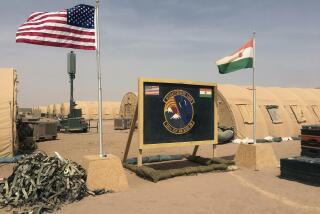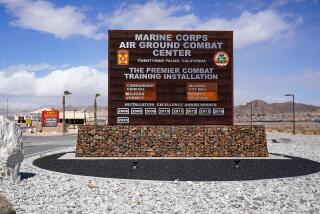Depleted El Toro Base Keeps Its Guard Up for Terrorism : Security: The commander is running extra alerts and drills. Call-ups have drained personnel, which puts added strain on Marines left behind, he says.
EL TORO — The brigadier general who commands the Marine air station here said Thursday that his troops have been running extra security drills to guard against possible terrorist attack and now somberly await any news of combat from overseas.
“The 15th is somewhat of a magic date and beyond that things can happen,” Brig. Gen. Wayne T. Adams said in his first interview since taking over in September as head of the Marine Corps’ four western air bases. “War is very possible in this scenario.”
Around the El Toro air base that is Adams’ new home, signs of these changed times are common: the sparser lines in the barber shop, shorter hours in some base stores and hangars now largely emptied of their multimillion-dollar aviation wares.
All are the result of the exodus of nearly 6,000 members of the 3rd Aircraft Wing from El Toro, Tustin, Camp Pendleton and Yuma, Ariz.--or nearly half the wing’s members--to the Middle East as part of Operation Desert Shield.
If those men and women are called into combat there, Adams says, it will prove to be “far more than just a little mop-up police action.”
To counter Iraq’s recognized land power, Adams--who spent the early 1980s on assignment in the Middle East--predicts that “you’ll see a massive use of air power” from the United States, and the 3rd Aircraft Wing could play a central role.
Brig. Gen. Harry W. Blot heads that portion of the 3rd wing that remains stateside, headquartered at El Toro. And Adams--the man they call “Bear” when he was in the cockpit of an F/A-18 jet, a name pinned on him nearly three decades ago for a likeness to an animal photo--oversees base operations for the western region.
A veteran of two tours in Vietnam, the 50-year-old Adams took over his present command at the end of September. The task at hand: running a set of bases that has lost nearly half of its active personnel to Operation Desert Shield.
While Adams maintains that it has been “business as usual” at El Toro and his other western bases, he acknowledges that flight operations have been cut drastically, the depleted troop strength has sometimes put a strain on services and moods can waver.
News such as that on Wednesday, when talks between Secretary of State James A. Baker III and Iraqi Foreign Minister Tarik Aziz failed, marks a “dramatic . . . traumatic” event in the lives of the military personnel and families left behind at El Toro, Adams said.
But the hardest part for many has been knowing that they are stateside while thousands of those they worked and lived with are waiting for war in the Middle East, the general said.
He personally would rather be in the Persian Gulf right now, the general said, adding firmly: “I don’t know any red-blooded Marine . . . who wouldn’t rather be on the pointy end of the spear.”
If called on now to go to the gulf, he added, “it’d take me about 10 minutes” to pack.
But in the meantime, Adams’ focus is on El Toro, and he says one of the key issues on that front is maintaining base security at a time of increased international hostility.
The prospect of an attack of some kind on a Southern California military installation may seem remote, but Adams points to a recent apprehension of an armed Iraqi national near one Southern California military base as a sign of the danger. And the El Toro base newspaper now regularly runs articles on the issue, with headline references to the threat of “terrorists.”
More to Read
Sign up for Essential California
The most important California stories and recommendations in your inbox every morning.
You may occasionally receive promotional content from the Los Angeles Times.










